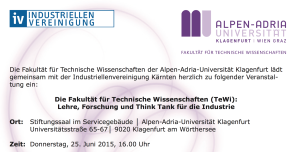Antrittsvorlesung von Univ.-Prof. Dr. Andrea M. Tonello | 23. Juni 2015 | 17 Uhr c.t. im HS 2
 ANDREA M. TONELLO received the laurea in electrical engineering (1996) and the Ph.D in telecommunications (2003) from the University of Padova, Italy. On February 1997, he joined Lucent Technologies where he worked on cellular communications in the Bell Labs Advanced Wireless Technology Laboratory, Whippany, NJ. He was promoted to technical manager in 2002 and appointed managing director of the Bell Labs Italy di- vision. In January 2003, he joined the Uni- versity of Udine, Italy. He became aggregate professor in 2005 and associate professor in 2014. Herein, he founded the Wireless and Power Line Communications Lab and the spin-off company WiTiKee. He was awarded the Italian full professor habilitation in 2013. In September 2014, he became full professor at the University of Klagenfurt, Austria, where he chairs the group on Embedded Communication Systems.
ANDREA M. TONELLO received the laurea in electrical engineering (1996) and the Ph.D in telecommunications (2003) from the University of Padova, Italy. On February 1997, he joined Lucent Technologies where he worked on cellular communications in the Bell Labs Advanced Wireless Technology Laboratory, Whippany, NJ. He was promoted to technical manager in 2002 and appointed managing director of the Bell Labs Italy di- vision. In January 2003, he joined the Uni- versity of Udine, Italy. He became aggregate professor in 2005 and associate professor in 2014. Herein, he founded the Wireless and Power Line Communications Lab and the spin-off company WiTiKee. He was awarded the Italian full professor habilitation in 2013. In September 2014, he became full professor at the University of Klagenfurt, Austria, where he chairs the group on Embedded Communication Systems.
His research focuses on wireless and power line communications, embed- ded and smart systems. He received the Bell Labs Recognition of Excellence award (2003), the Distinguished Visiting Fellowship from the Royal Academy of Engineering, UK (2010) and the Distinguished Lecturer Award by the IEEE Vehicular Technology Society (2011-15). He is the co-recipient of five best paper awards. He was the general chair of IEEE ISPLC 2011 and IEEE Smart- GridComm 2014. He serves as an associate editor for the IEEE Transactions on Communications and IEEE Access. He is the chair of the IEEE ComSoc Technical Committee on Power Line Communications.
Wir freuen uns sehr auf Ihre/Deine Teilnahme und bitten um kurze Bestätigung per E-Mail an marlene.starc@aau.at.


